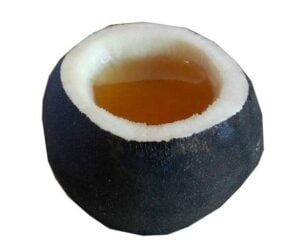
Preparation :
Ingredients:
- 1 large black radish
- Sugar or honey (to cover the grated radish)
Instructions:
- Wash the Black Radish:
- Thoroughly rinse the black radish under running water to remove any dirt or impurities from its skin. Use a vegetable brush if necessary to ensure it is clean.
- Cut the Radish:
- Cut off the top part of the radish to create a small opening resembling a well. This will serve as the container for the syrup.
- Prepare the Radish:
- Option 1: Grate the Radish
- Use a grater to shred the radish into small pieces. Grating increases the surface area, allowing more juice to be extracted.
- Option 2: Chop the Radish
- Alternatively, chop the radish into tiny cubes. This method is less messy and equally effective.
- You can choose to leave the skin on or remove it, depending on your preference. The skin contains additional nutrients, so leaving it on can be beneficial.
- Option 1: Grate the Radish
- Add Sweetener:
- Place the grated or chopped radish into the well you’ve created.
- Pour sugar or honey over the radish until it is completely covered. Both sugar and honey act as osmotic agents, drawing out the natural juices from the radish to form the syrup.
- Wait for the Syrup to Form:
- Allow the radish and sweetener to sit for several hours or overnight. As the sugar or honey dissolves, it will mix with the radish juices, creating a syrup inside the radish.
- Collect the Syrup:
- Carefully pour the syrup that has formed within the radish into a clean jar or bottle for storage. Ensure that the container is sterilized to maintain the syrup’s purity.
- Wash the Black Radish:
 Administration :
Administration :
Dosage:- For adults:
- Take 1 to 2 tablespoons of the black radish cough syrup, 2 to 3 times a day. Adjust the dosage according to the severity of the cough. If symptoms persist or worsen, consult a healthcare provider.
- For children (above one year old):
- Administer 1 teaspoon of the black radish cough syrup, 2 to 3 times a day. Ensure the dosage is appropriate for the child’s age and weight. If in doubt, consult a pediatrician before use.
- Timing:
- It is best to take the black radish cough syrup before meals. Taking it on an empty stomach can help maximize its soothing effects on the throat and reduce the urge to cough. If taken after meals, the syrup may be less effective due to the presence of other substances in the stomach.
- Shaking:
- Shake the radish syrup well before each use. This ensures that the active compounds are evenly distributed throughout the syrup, providing a consistent dosage and effectiveness.
- Storage:
- Store the unused portion of the syrup in an airtight container in the refrigerator. Proper storage helps maintain the syrup’s freshness and potency. Generally, the syrup can be kept for a few days. If any changes in color, odor, or texture are noticed, it is best to prepare a fresh batch to ensure safety and efficacy.
- Observation:
- Monitor the individual for any allergic reactions or side effects. Although rare, some people may experience mild digestive discomfort. If any adverse effects are observed, discontinue use and consult a healthcare provider.
- Hydration:
- Encourage drinking plenty of fluids alongside the syrup. Staying hydrated helps thin mucus, making it easier to expel and providing additional relief from coughing.
- Complementary Remedies:
- The black radish cough syrup can be used alongside other natural remedies, such as herbal teas (e.g., chamomile or ginger tea) and steam inhalation, to enhance its effectiveness. Avoid combining it with other over-the-counter cough medicines unless advised by a healthcare provider.
 Precautions:
Precautions:
- Allergic Reactions:
- While black radish cough syrup is a natural remedy, some individuals might be allergic to radishes. Symptoms of an allergic reaction can include itching, rash, swelling, dizziness, and difficulty breathing. Discontinue use immediately if any adverse reactions occur, and seek medical attention if necessary.
- Consultation:
- This homemade cough syrup should not be used as a replacement for prescribed medications or professional medical advice in severe cases of cough or respiratory conditions. If symptoms are severe, persistent, or accompanied by high fever, chest pain, or difficulty breathing, consult a healthcare provider promptly.
- Children:
- Do not administer to children under one year old due to the risk of botulism from honey. For older children, always consult with a pediatrician before using natural remedies to ensure they are safe and appropriate.
- Pregnancy and Breastfeeding:
- Pregnant or breastfeeding women should consult their healthcare provider before using black radish cough syrup to ensure it is safe for them and their baby.
- Diabetes:
- Individuals with diabetes should be cautious when using black radish cough syrup, especially if it is made with sugar or honey, as these can affect blood sugar levels. Consult with a healthcare provider to determine if this remedy is suitable and to adjust dietary intake accordingly.
Health Benefits of Black Radish Cough Syrup:
 Expectorant Properties:
Expectorant Properties:
Black radish contains compounds that act as natural expectorants, helping to loosen and expel mucus from the respiratory tract. This can be particularly beneficial for individuals experiencing productive coughs, as it aids in clearing the airways and reducing congestion.One of the key components responsible for these expectorant properties is glucosinolate, which is found in significant amounts in black radish. When glucosinolates are broken down in the body, they produce biologically active compounds such as isothiocyanates, which help in the thinning of mucus, making it easier to expel.Additionally, black radish is rich in sulfur compounds, which are known for their mucolytic effects. These compounds help break down the bonds in mucus, reducing its viscosity and facilitating its removal from the respiratory tract. This action is particularly useful for individuals suffering from chronic bronchitis or other conditions characterized by excessive mucus production. By aiding in mucus clearance, black radish syrup not only alleviates coughing but also helps prevent secondary infections that can arise from mucus stagnation in the airways.Another notable feature of black radish cough syrup is its high content of essential oils and volatile compounds. These substances contribute to its overall effectiveness as an expectorant by promoting increased secretion of the watery component of mucus, which helps in diluting thick mucus. This dual action of breaking down mucus and enhancing its expulsion makes black radish syrup distinct from many commercial cough syrups, which often focus solely on suppressing cough without addressing mucus clearance. Antioxidant Activity:
Antioxidant Activity:
Black radish is rich in antioxidants, such as phenolic compounds and flavonoids. These antioxidants help neutralize harmful free radicals in the body, which can protect the respiratory system from oxidative stress and inflammation.The high antioxidant content of black radish distinguishes it from many other natural cough remedies, making it particularly effective in safeguarding the cells of the respiratory tract from damage. This protection helps maintain the integrity of the mucous membranes, which are essential for a healthy respiratory system.Moreover, the phenolic compounds in black radish have been shown to enhance the body’s natural defense mechanisms. By bolstering the antioxidant defenses, these compounds can reduce the frequency and severity of coughing episodes, promoting a quicker recovery. Unlike many commercial cough syrups, which often rely on synthetic additives, black radish syrup offers a natural source of potent antioxidants, providing a holistic approach to respiratory health.Additionally, the flavonoids found in black radish contribute to its overall health benefits. These bioactive compounds have been linked to a range of positive health outcomes, including improved cardiovascular health and enhanced metabolic function. In the context of a cough syrup, the presence of flavonoids supports the body’s ability to repair and regenerate tissue, further aiding in the recovery process. This combination of phenolic compounds and flavonoids in black radish sets it apart from other natural and commercial cough remedies, offering a unique and powerful option for those seeking to support their respiratory health naturally. Anti-Inflammatory Effects:
Anti-Inflammatory Effects:
Studies have demonstrated the anti-inflammatory properties of black radish extract. These anti-inflammatory compounds can help reduce irritation in the throat and respiratory tract, providing relief from coughing caused by inflammation.One of the primary compounds responsible for these effects is glucosinolate. Glucosinolates are sulfur-containing compounds found in cruciferous vegetables, including black radish. When metabolized, glucosinolates break down into biologically active compounds, such as isothiocyanates, which have been shown to inhibit inflammatory pathways and reduce the production of pro-inflammatory cytokines.Furthermore, black radish contains phenolic compounds, which are known for their anti-inflammatory and antioxidant properties. Phenolics can modulate the inflammatory response by inhibiting the activity of enzymes like cyclooxygenase (COX) and lipoxygenase (LOX), which are involved in the synthesis of inflammatory mediators. By targeting these enzymes, phenolic compounds help to alleviate inflammation and reduce the associated discomfort and swelling in the respiratory tract.Another unique aspect of black radish’s anti-inflammatory effects is its high content of vitamin C. Vitamin C is a powerful antioxidant that also plays a crucial role in regulating the body’s immune response and reducing inflammation. By scavenging free radicals and supporting the function of immune cells, vitamin C helps to protect the tissues in the throat and respiratory tract from oxidative stress and inflammatory damage.Immune System Support:
Black radish contains essential nutrients, including vitamin C and zinc, which are known to support the immune system. A strengthened immune system can better combat respiratory infections and reduce the severity of cough symptoms.One of the unique health benefits of black radish cough syrup is its high concentration of glucosinolates. These sulfur-containing compounds are potent inducers of detoxifying enzymes in the body. By promoting the body’s natural detoxification processes, glucosinolates help eliminate toxins and pathogens, contributing to a stronger immune response. This property sets black radish apart from many other natural remedies and commercial cough syrups that may lack such effective detoxifying agents.Additionally, black radish is rich in essential minerals like potassium, magnesium, and calcium. These minerals play a crucial role in maintaining electrolyte balance and ensuring proper cellular function, which is vital for a robust immune system. Potassium, for instance, supports muscle function and nerve signaling, while magnesium is critical for DNA synthesis and repair. The presence of these minerals in black radish cough syrup provides a holistic approach to boosting overall health and resilience against illnesses.Antibacterial and Antiviral Properties:
Black radish exhibits antibacterial and antiviral activities against certain pathogens. This can help in combating respiratory infections that often lead to persistent coughs.Antibacterial and antiviral properties are key components that set black radish cough syrup apart from other remedies. The active compounds present in black radish, such as glucosinolates and phenolic compounds, contribute to its potent antimicrobial effects. These compounds target and inhibit the growth of certain bacteria and viruses, making black radish cough syrup a valuable ally in the fight against respiratory infections.The antibacterial properties of black radish are particularly beneficial in combating bacterial infections commonly associated with respiratory illnesses, such as bronchitis and sinusitis. By inhibiting the growth of pathogenic bacteria, black radish cough syrup can help reduce the severity and duration of these infections, ultimately relieving cough symptoms and promoting faster recovery.Moreover, the antiviral activity of black radish is noteworthy, especially in the context of viral respiratory infections like the common cold and influenza. The compounds found in black radish have been shown to interfere with viral replication processes, effectively limiting the spread of viruses within the body. As a result, using black radish cough syrup may help lessen the intensity of viral symptoms and shorten the duration of illness.Soothing Effect on Throat:
The natural sugars present in the syrup can create a soothing effect on the throat, reducing irritation and discomfort associated with coughing. Furthermore, the texture of the syrup helps to coat the throat, providing a protective barrier against further irritation from dry air or other irritants. This can be particularly beneficial during colder months when indoor heating systems can dry out the air and exacerbate throat discomfort.Moreover, black radish cough syrup contains additional components that contribute to its throat-soothing properties. For example, the mucilage found in black radish may form a gel-like substance when ingested, which can further coat the throat and provide relief from irritation. Additionally, the presence of certain vitamins and minerals in black radish, such as vitamin C and zinc, can support the health of mucous membranes in the throat, promoting faster healing and reducing inflammation.Conclusion:
Homemade black radish cough syrup is a time-tested natural remedy that can provide relief from cough and soothe irritated throats. Its simple preparation and administration make it an accessible and effective option for those seeking natural alternatives to over-the-counter cough syrups. From its expectorant properties to its antioxidant and anti-inflammatory effects, black radish cough syrup offers a natural way to alleviate cough and promote respiratory health. Remember to consult a healthcare professional if your cough persists or worsens, especially if accompanied by other symptoms.Contraindications
Although black radish cough syrup is generally considered safe and well-tolerated, there are some contraindications and precautions to be aware of:Allergic Reactions:
Some individuals may be allergic to radishes or related vegetables like horseradish and mustard. If you have a known allergy to these vegetables, avoid using black radish cough syrup as it may trigger allergic reactions.Gastrointestinal Sensitivity:
The natural compounds found in black radish, especially when concentrated in the syrup, may cause gastrointestinal discomfort or upset in some people. If you experience digestive issues after taking the syrup, discontinue its use.Interaction with Medications:
Black radish may interact with certain medications, especially those related to blood clotting or thyroid function. If you are taking any medications or have an underlying health condition, consult your healthcare provider before using black radish cough syrup.Pregnancy and Breastfeeding:
There is limited research on the safety of black radish during pregnancy and breastfeeding. To avoid any potential risks, it is best for pregnant or breastfeeding individuals to avoid using this syrup unless recommended by a healthcare professional.Children Under One Year:
Honey, which is sometimes used as a sweetener in the syrup, should not be given to children under one year old due to the risk of botulism. Therefore, black radish cough syrup should not be administered to infants.Chronic Cough or Serious Respiratory Conditions:
If you have a persistent or chronic cough, or if you suspect a more severe respiratory condition, do not rely solely on black radish cough syrup. Consult a healthcare professional for proper evaluation and management.It’s essential to approach natural remedies with caution and always seek advice from a healthcare professional, especially if you have any pre-existing medical conditions or are currently taking medications. While black radish cough syrup can be beneficial for many individuals, it is not a substitute for professional medical care when dealing with more serious health concerns.Click here if you want to see more articles from the remedies categoryReference
- Inhibitory Effect of Black Radish (Raphanus sativus L. var. niger) Extracts on Lipopolysaccharide-Induced Inflammatory Response in the Mouse Monocyte/Macrophage-Like Cell Line RAW 264.7 https://pubmed.ncbi.nlm.nih.gov/33505935/
- Wang, S., Xu, L., Yang, J., Wang, Y., & Dai, S. (2020). Chemical composition and antioxidant activities of black radish (Raphanus sativus L. var. niger) extract. Food Chemistry, 312, 126079.
- Immunomodulatory Effects of an Aqueous Extract of Black Radish on Mouse Macrophages via the TLR2/4-Mediated Signaling Pathway https://pubmed.ncbi.nlm.nih.gov/36355548/
- Zhang, H., Chen, Y., Li, T., Guo, H., & Lu, Q. (2018). Immunomodulatory effects of black radish (Raphanus sativus L. var. niger) extract on macrophage activation. Journal of Functional Foods, 49, 64-71.
- Antioxidant effect of squeezed juice from black radish (Raphanus sativus L. var niger) in alimentary hyperlipidaemia in rats https://pubmed.ncbi.nlm.nih.gov/16161062/
Disclaimer:
The information provided in this article is intended for educational purposes and is not a substitute for professional medical advice. While natural remedies may offer potential benefits, it is important to understand that individual responses may vary. Therefore, it is advisable to consult a qualified health professional before integrating new naturopathic practices into your routine. This ensures you receive personalized guidance tailored to your specific needs and health profile. Prioritizing your well-being and safety is essential, and seeking professional advice empowers you to make informed decisions about your naturopathic regimen.
Additionally, it is important to note that while we strive to provide accurate and helpful information, we do not assume any responsibility for the use of these remedies. Individual experiences and results may vary, and it is the reader's responsibility to exercise caution and discretion when incorporating new naturopathic practices into their routine. By continuing to use these remedies, readers acknowledge and accept this disclaimer.

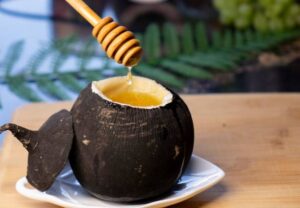 Administration :
Administration :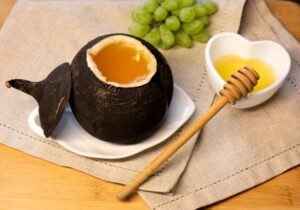 Precautions:
Precautions: Expectorant Properties:
Expectorant Properties: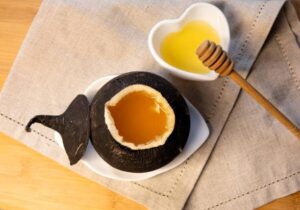 Antioxidant Activity:
Antioxidant Activity: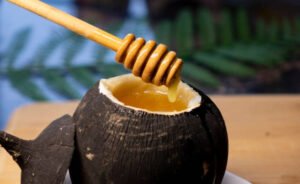 Anti-Inflammatory Effects:
Anti-Inflammatory Effects: